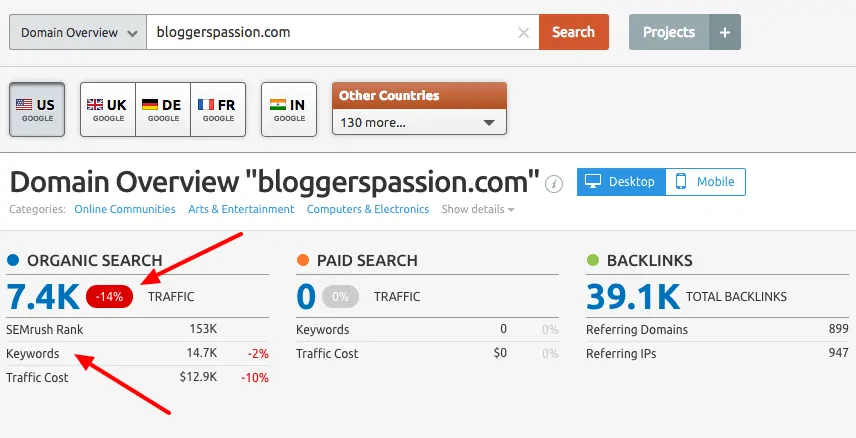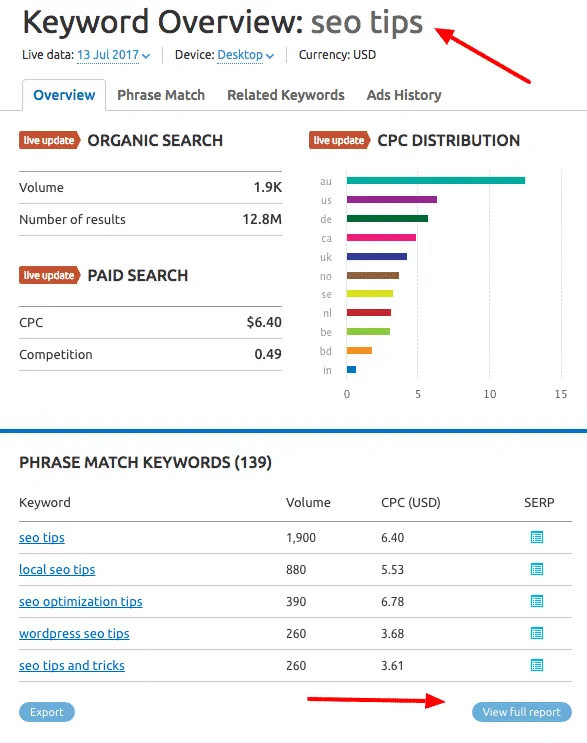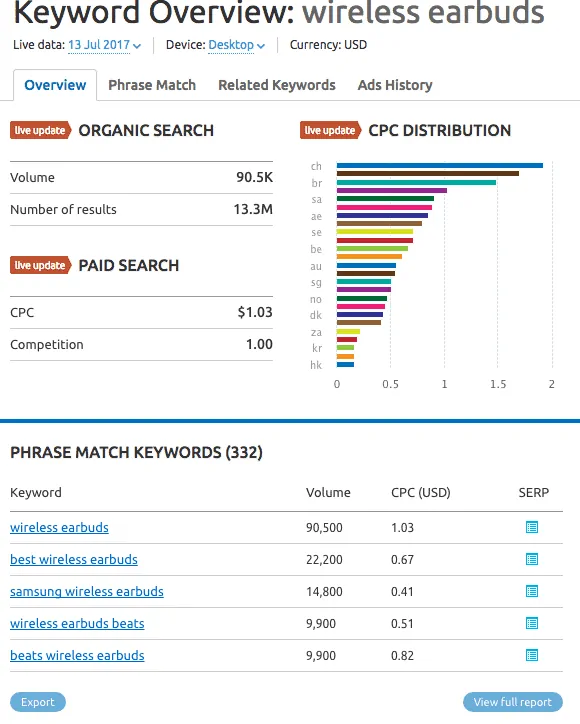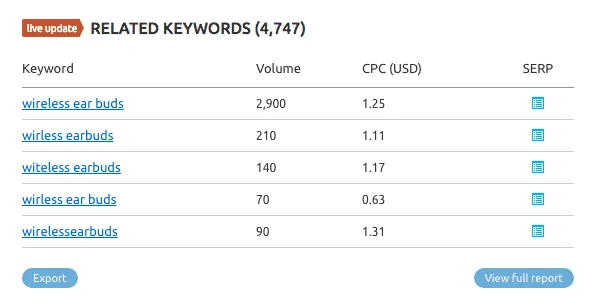Table of Contents
How to Find Blog Post Ideas Using Semrush Quickly

Disclosure: We get a commission when you buy a product via our affiliate link at no additional cost.
Quick Note: For this tutorial, we are using Semrush. Make sure to grab Semrush 14 days free trial (worth $139.95) to get the most out of this tutorial to find blog post ideas that increase your search traffic and sales..1: Evaluate your current keyword rankings
You need to find out your current keyword rankings (you must know where you currently stand) in Google search before starting your journey to finding high traffic generating blog post topics with Semrush. Although there are a lot of tools out there to know your current keyword rankings, Semrush gives you accurate results. Once you’re on Semrush dashboard, just enter your website into Semrush’s search bar and then click search. Now click either the big blue number under Organic Search or use the left-hand sidebar to click on “Organic Research”. Here’s how it looks like. This will show you all of the keywords your website is currently ranking for within Semrush, using the Organic Positions Report.
This will show you all of the keywords your website is currently ranking for within Semrush, using the Organic Positions Report.
 Based on the keywords, it tells you where you are currently ranking. In the above screenshot, you can see the position you are ranking for your keywords, analytical data including search volume, traffic %, cost %, competition level and much more.
So, you know where you stand, and now take a look at what your competitors are ranking for. Enter your competitor into the search bar at the top and go to the same report to see this data.
If you don’t know who your content website’s competitors are, then go to the Organic Research Competitors report and it will tell you based on commonly ranking keywords, who you should consider as a competitor.
Once you find out your competitor, then go to that domain’s Organic Positions report. Here you can see what their top performing keywords are. You can even see what keywords are driving the most traffic to their website by sorting this by Traffic %.
Now, analyze these two things from the report:
Based on the keywords, it tells you where you are currently ranking. In the above screenshot, you can see the position you are ranking for your keywords, analytical data including search volume, traffic %, cost %, competition level and much more.
So, you know where you stand, and now take a look at what your competitors are ranking for. Enter your competitor into the search bar at the top and go to the same report to see this data.
If you don’t know who your content website’s competitors are, then go to the Organic Research Competitors report and it will tell you based on commonly ranking keywords, who you should consider as a competitor.
Once you find out your competitor, then go to that domain’s Organic Positions report. Here you can see what their top performing keywords are. You can even see what keywords are driving the most traffic to their website by sorting this by Traffic %.
Now, analyze these two things from the report:
- Do any of these keywords relate to your website?
- And, check for the keywords listed in this report that you are not currently ranking for.
2. Explore long tail keywords
By knowing your competitors’ high traffic generating keywords, you can increase search engine traffic to your blog than your competitors and can make great content around those keywords. Enter any seed keyword related to your niche into the Semrush search box. Here I enter, “SEO tips”. In the above screenshot, you can see an overview of this keyword. It provides the trending data for this keyword, the organic and paid search opportunities, as well as phrase match and related keywords data.
You can take a look at full report for a deeper dive into it. In full report, you can identify relevant and important keywords that have search volumes. One way to do keyword research is targeting a keyword with search volumes.
With the Phrase Match Report, you can find out the Keyword Difficulty, the suggested CPC (in USD), the Competitive Density (PPC), the number of Results (in Google), the Trend for this particular keyword.
Remember, doing keyword research is all about looking at the search volume and the keyword difficulty for a particular phrase. If you find no search volume for any particular keyword, then try targeting multiple phrases in one article.
In the trial period, Semrush will only give you some amount of keyword ideas.
In the above screenshot, you can see an overview of this keyword. It provides the trending data for this keyword, the organic and paid search opportunities, as well as phrase match and related keywords data.
You can take a look at full report for a deeper dive into it. In full report, you can identify relevant and important keywords that have search volumes. One way to do keyword research is targeting a keyword with search volumes.
With the Phrase Match Report, you can find out the Keyword Difficulty, the suggested CPC (in USD), the Competitive Density (PPC), the number of Results (in Google), the Trend for this particular keyword.
Remember, doing keyword research is all about looking at the search volume and the keyword difficulty for a particular phrase. If you find no search volume for any particular keyword, then try targeting multiple phrases in one article.
In the trial period, Semrush will only give you some amount of keyword ideas.
3. Solve a common issue
Semrush helps you to find new content ideas and also rank highly in the SERPs. Here are the few things you need to do for this.- Choose your competitor: Make a list of all the top blogs in your niche in a spreadsheet. Now enter each one in Semrush search bar. Head over to the left hand navigation and choose “Organic Research” from the “Domain Analytics” dropdown.
- Apply filters: To analyze your competitor’s data, you need to apply filter. After applying filter, you can now see all the ranking keywords of your competitor. From each filter, you can understand each keyword phrase and how realistic your chances of ranking for it.
- Sort it: Usually, Semrush sort the results by traffic that displays branded terms at the top. Look at Semrush’s Keyword Difficulty, if you are not seeing any results, then increase to <90.
- Spot the opportunity: Find out a long tail query that is ranking on the first page and has more searches per month.
- Answer the query.
- Create valuable and relevant content.
- Keep metadata and page titles relevant to the search query.
4. Semrush SEO ideas tool
For a blogger, the SEO Ideas tool is an extremely powerful tool. You may have one target keyword for your page but you are not sure what context to use with it. This is exactly what the SEO Ideas tool does for you. The SEO Ideas tool will give you related words to include in your content based on who is ranking for the keyword you are targeting based on your Position Tracking and Site Audit data.- It offers a complete and structured list of things you could do to improve your rankings for certain pages of your website.
- It provides you a well-defined actionable plan on how to improve your page’s rankings for the Google- top-10 keywords you specify.
- SEO Ideas tool automatically offers practical suggestions by utilizing SEO tactics from your competitors and analytical research data from Semrush.
- Check out the Detailed Analysis report, if you wish to do your own research based on the automatically gathered data. This report will provide you with all information for a selected landing page by comparing the page with results collected from your top-10-ranking competitors.
- You will get a list of semantically related keywords to include in your content.
- You can connect Google Analytics to generate ideas to improve the user experience of your pages.
- You can also generate content templates based around your target keywords
5. Find content ideas
Well, you may be wondering how to use Semrush to get content ideas. Here I discuss for an ecommerce website. Okay, let’s start with the keyword phrase, “wireless earbuds”. By taking this example keyword phrase and digging deeper using Semrush, you can find even more content ideas for an ecommerce website. Enter “wireless earbuds” into a Semrush search bar. You can see a lot of data for this keyword. Let’s see more into Organic search results like who is showing up in the organic search results for clothing and accessories. Dig a little deeper to find some content ideas.
You can see a lot of data for this keyword. Let’s see more into Organic search results like who is showing up in the organic search results for clothing and accessories. Dig a little deeper to find some content ideas.
 Looking at “phrase match report” and the “related keywords report.”, you can immediately come up with a list of keywords. Using the Semrush data, it’s really easy to see both the “phrase match” keywords and the “related keywords” right next to each other.
And, it turns out that the “related keywords” really bring in much more potential traffic than the “phrase match” keywords.
To find more content marketing ideas and to find more ideas, observe what keyword phrases those top-ranking sites are showing up for, and where they are getting their traffic. Run a full report to find some really good content ideas.
Looking at “phrase match report” and the “related keywords report.”, you can immediately come up with a list of keywords. Using the Semrush data, it’s really easy to see both the “phrase match” keywords and the “related keywords” right next to each other.
And, it turns out that the “related keywords” really bring in much more potential traffic than the “phrase match” keywords.
To find more content marketing ideas and to find more ideas, observe what keyword phrases those top-ranking sites are showing up for, and where they are getting their traffic. Run a full report to find some really good content ideas.




Useful tool!!
SEMRush is a good analytical tool for keywords research.
Thank You for sharing these information
Great Post.
I used Semrush it is awesome software for audit our website.
SEMRush is a good analytical tool for keywords research though.
I really like how it details some of the things you may never have noticed
Thanks for sharing, Semrush i guess is the best seo tools and i must give it a try any moment from now
Hey Anil,
I am using ahrefs Tools, but it is too Costly. I want to use SEMrush
Shailesh, please use /recommended/semrush/ link to try SEMrush Pro version worth $99.95 for free for the next 30 days. Please let me know in case you have any additional question about SEMrush for me.
To find more content marketing ideas and to find more ideas that you could write about on your website’s blog, for example, the next step would be to take those competitors and dig deeper using SEMrush.
At Present Iam Fresher.I dont have much knowledge of seo tools.But mostly I use SEMRUSH Tool.Thank You For Sharing Such Valuable Information which is helpful for my future.
keep track of competator using semrush is good idea .thanks for the post. There any other tools other than semrush?
krishnaveni, you find some of best alternative for SEMrush from here /semrush-alternatives/
Nice post Anil. Spying on a competitor is the best idea for someone who is looking for quick tips on the idea. But still, you have to decide per the competition, cost, etc. There is no point in going after some keyword whose competition is high.
SEMRUSH is a great tool in terms of keyword research. I would also suggest long tail pro for looking for more targeted keyword research ideas.
Thanks.
I see, this is the post which became the top article of SEMrush monthly contest! There’s no need to praise about SEMrush because it’s boss in the field of search engine marketing.
I wanna praise your content now. SEMrush didn’t make any mistake by choosing your post as the winner.
Keep up the good work bro,
SM